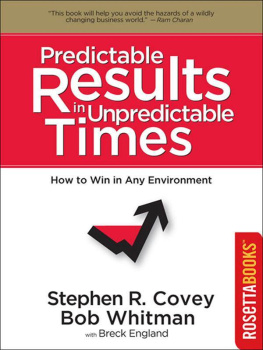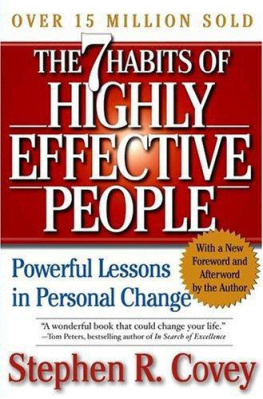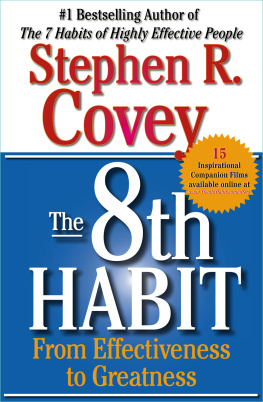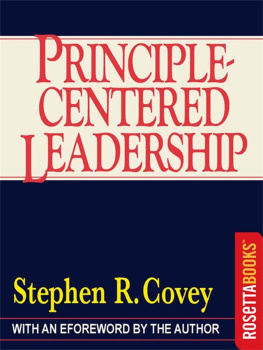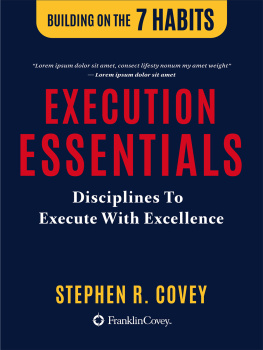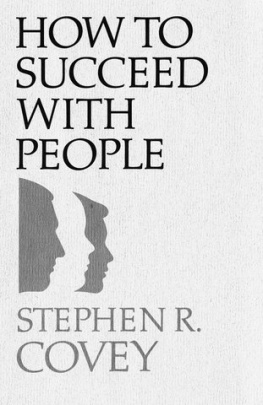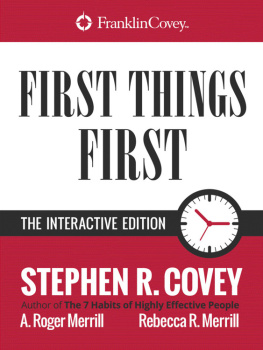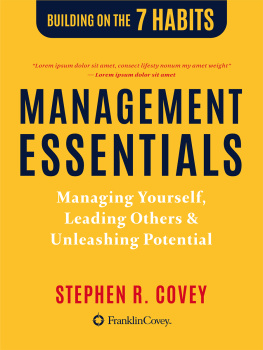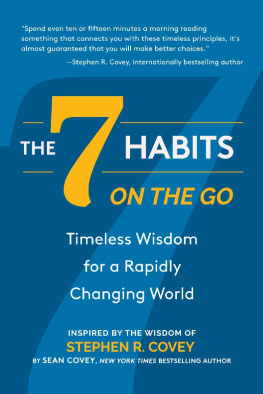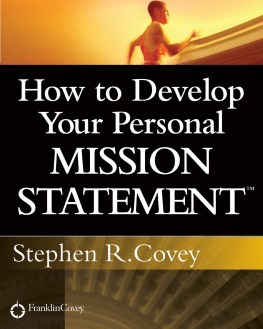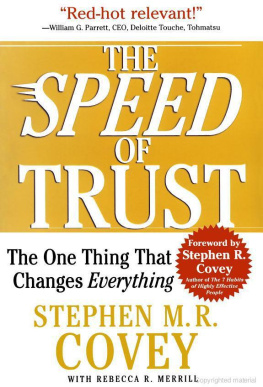Stephen R. Covey - Predictable Results in Unpredictable Times
Here you can read online Stephen R. Covey - Predictable Results in Unpredictable Times full text of the book (entire story) in english for free. Download pdf and epub, get meaning, cover and reviews about this ebook. year: 2009, publisher: RosettaBooks, genre: Business. Description of the work, (preface) as well as reviews are available. Best literature library LitArk.com created for fans of good reading and offers a wide selection of genres:
Romance novel
Science fiction
Adventure
Detective
Science
History
Home and family
Prose
Art
Politics
Computer
Non-fiction
Religion
Business
Children
Humor
Choose a favorite category and find really read worthwhile books. Enjoy immersion in the world of imagination, feel the emotions of the characters or learn something new for yourself, make an fascinating discovery.
- Book:Predictable Results in Unpredictable Times
- Author:
- Publisher:RosettaBooks
- Genre:
- Year:2009
- Rating:3 / 5
- Favourites:Add to favourites
- Your mark:
- 60
- 1
- 2
- 3
- 4
- 5
Predictable Results in Unpredictable Times: summary, description and annotation
We offer to read an annotation, description, summary or preface (depends on what the author of the book "Predictable Results in Unpredictable Times" wrote himself). If you haven't found the necessary information about the book — write in the comments, we will try to find it.
Predictable Results in Unpredictable Times — read online for free the complete book (whole text) full work
Below is the text of the book, divided by pages. System saving the place of the last page read, allows you to conveniently read the book "Predictable Results in Unpredictable Times" online for free, without having to search again every time where you left off. Put a bookmark, and you can go to the page where you finished reading at any time.
Font size:
Interval:
Bookmark:
Predictable Results in Unpredictable Times
Stephen R. Covey Robert Whitman
with Breck England
Copyright
Predictable Results in Unpredictable Times
Copyright 2009 FranklinCovey Co. All Rights Reserved
No part of this book in any form may be reproduced, in any form or by any means, without permission in writing from the publisher. Requests to the Publisher for permission should be addressed to the Rights Manager, FranklinCovey Co., 2200 W. Parkway Blvd., Salt Lake City, Utah 83119, (801) 817-1776, email: legal@franklincovey.com
Company and product names mentioned herein are the trademarks or registered trademarks of their respective owners. SPEED OF TRUST is a registered trademark of CoveyLink LLC, which is used herein under license.
Published by FranklinCovey Publishing, a division of Franklin Covey Co.
First electronic edition published 2009 by RosettaBooks LLC, New York.
ISBN Mobipocket edition: 9780795304590
You are exposed to the improbable only if you let it control you. You always control what you do.
Nassim Nicholas Taleb
Every summer a colorful crowd of cyclists race each other in what is billed as the greatest human endurance test of all timethe Tour de France. On the flat, sunny terrain, they bunch up in a peloton, or platoon, some jockeying for the front, some coasting along in the slipstream of a rider inches ahead. But they mostly stay together. When the going is relatively easy, the peloton speeds along at a predictable pace.
Then comes the severe test of the mountains. Uncertain weather hits. Improbably, even in July the Alps can produce freezing rain and sleet. By contrast, the desert-like Mont Ventoux in the south of France is heatstroke waiting to happen. As the cyclists climb thousands of meters, the peloton strings out. Riders tire and drop away. Teams fall inexorably behind.
Its in these extreme conditions that the great teams take the lead.
At times, your team or your company or your organization will face extreme conditions, with steep terrain and dramatic changes in climate. No one can see beyond the next hill. Even in a turnaround, theres no likelihood of an easy rideweve moved into a world where the measured risks of the past seem tame compared to what we face today. Future crises might be more severe than anything weve experienced. From here on, everyone agrees, we may be in the mountains.

The Tour is actually a team effort, and losing teams lack the disciplined execution of the winners.

Thats when the great leaders will move into view.
Great leaders are different. They anchor themselves in principles that are certain and solid, even in an uncertain and fluid environment. They know the world is unpredictable. Still, they get predictable results.
How do they do it?
Before we go there, lets consider the reasons why so many competitors falter and drop out when they hit the mountains. It isnt usually a lack of strength or abilitymost Tour de France participants are superbly conditioned or they wouldnt be there.
The Tour is actually a team effort, and losing teams lack the disciplined execution of the winners. Winning team members must be able to trust each other without reserve to do their jobs precisely. They must be constantly focused, actively taking every opportunity to move the strategy forward. Otherwise, an accumulation of small mistakes will mean disaster.
Long experience with thousands of private and public entities around the globe has taught us that this lack of discipline makes all the difference in the mountains. At FranklinCovey, we have studied the team disciplines of more than 300,000 people in 17,000 work units in 1,100 organizations. We have interviewed most of the people in 5,000 of these units. We combined interview results with financial, operating, and customer-loyalty data from a large number of matched pair organizations. This combined research has helped us understand the factors that truly differentiate top performers from lesser performers, the Lance Armstrongs from the also-rans.
Like the Tour de France cycling teams, companies trying to navigate in unpredictable times face four key hazards:
- Failure to execute
- Crisis of trust
- Loss of focus
- Pervasive fear
Failure to execute. Youve thought through the crisis. You have your strategy. Now the question is, can your teams execute? Will they? Some people in your organization are getting it done. Some arent and probably never will. Then theres the great middlehow much more could they contribute if they performed more like those who are getting it done?
Crisis of trust. Levels of trust drop in uncertain times. Securities markets plunge due to crises of confidence. People lose confidence in their own organizations. On an uncertain road full of pitfalls, everyone decelerates: its not called a slowdown for nothing.
Loss of focus. You have fewer resources, fewer people, more confusion. People try to do two or three jobs at once. A person trying to do two jobs has half the focus of a person doing one job, and half the likelihood of doing either job well.
Pervasive fear. Economic recession causes psychological recession. People fear losing jobs, retirement savings, even their homes. Its piling on. And it costs you. Just when you need people to focus and engage, they lose focus and disengage.
As you probably recognize, these four hazards occur together in times of turmoil. They reinforce each other. A crisis of trust stirs up fear. Fear and anxiety lead to a loss of focus. And a loss of focus puts strategy execution at risk. In such times, you simply cant afford to execute your strategy with anything less than precision.
To succeed in the mountains, like the great cyclists, you must anticipate these hazards. You can dodge the hazards and win if you:
- Execute priorities with excellence.
- Move with the speed of trust.
- Achieve more with less.
- Reduce fear.
Execute priorities with excellence. The winning companies have simple goals repeatedly revisited, together with clear targets and strong follow-through, including the measurement of results.goals and their roles in carrying them out. And they execute precisely.
Move with the speed of trust. Low trust slows everything down and raises costs. Thats why the economy, your clients, and your cash flow slow down in times of turmoil. But when trust levels rise, everything speeds up and costs go down. The winning organizations are capable of quick action with the agility to respond ahead of, or at least stay even with, rapid changes in the new economic environment.
Achieve more with less. Of course, everyone is trying to do more with less, but the real question is more of what? Shouldnt it be more of what your key stakeholders truly value and less of what they dont want? The winning companies focus totally on valuethey are not just cutting back, they are simplifying, reducing complexities that customers and employees dont value. Instead of having everyone do two or three jobs, they focus on doing the job that key stakeholders really want done.
Reduce fear. The root of psychological recession is the sense that people have no control over what happens to them. Winning organizations help people break through that hopelessness and focus on what they can impact. Much of the fear is caused by unclear direction, by a less-than-compelling purpose. Entrusted with a mission and strategy they can believe in, they channel their anxious energy into results.
Font size:
Interval:
Bookmark:
Similar books «Predictable Results in Unpredictable Times»
Look at similar books to Predictable Results in Unpredictable Times. We have selected literature similar in name and meaning in the hope of providing readers with more options to find new, interesting, not yet read works.
Discussion, reviews of the book Predictable Results in Unpredictable Times and just readers' own opinions. Leave your comments, write what you think about the work, its meaning or the main characters. Specify what exactly you liked and what you didn't like, and why you think so.

